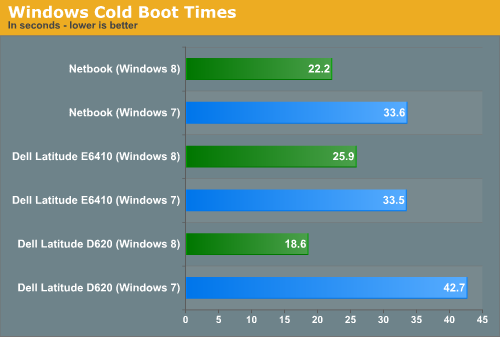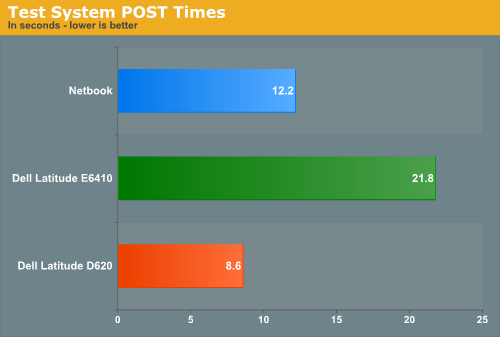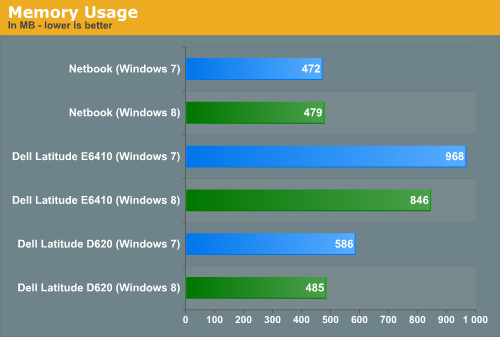In-Depth with the Windows 8 Consumer Preview
by Andrew Cunningham, Ryan Smith, Kristian Vättö & Jarred Walton on March 9, 2012 10:30 AM EST- Posted in
- Microsoft
- Operating Systems
- Windows
- Windows 8
To test claims of faster booting and lower memory usage in Windows 8, I installed a fresh copy of Windows 7 on each of three different computers of varying vintages—a Dell Latitude E6410 with 8GB of RAM and an SSD, a Dell Latitude D620 with 2GB of RAM and an HDD, and a lowly netbook with 1GB of RAM and an HDD. More complete specs for these systems can be found on this page, in which I discuss the computers on which I’ve been running Windows 8. Each computer had the most recent drivers for all of its hardware installed.
Startup time is defined as the amount of time between when the power button is pressed and when the Windows login screen is ready for input. POST time is defined as the amount of time between when the power button is pressed and when the “Starting Windows” boot screen first appears. After measuring all times in Windows 7, I reformatted the hard drives, installed Windows 8 and any needed drivers, and measured boot times in the same way.

Microsoft claimed that Windows 8 featured improved boot times, and that claim is definitely true—boot times vs. Windows 7 are down across the board. These reductions are due to some architectural changes that Microsoft has made—a Windows 7 shutdown would completely purge the OS and all running programs and user sessions from memory and then re-load a fresh copy at next boot. Windows 8 unloads the user session and running programs from memory, but saves the core OS to disk from RAM as it would do if the OS were hibernating. The result is a much faster startup time all around, even on mechanical HDDs. If, for whatever reason, your system doesn’t support hibernation (or if you’ve turned it off), these boot time advantages will evaporate.
But what's that, you say? How is a netbook that barely meets the minimum system requirements booting more quickly than a late-model Dell Latitude? Perhaps these numbers will clear things up:

This is one of the instances where hardware designed for Windows 8 will probably have an advantage over older hardware that has been upgraded—as you can see here, a computer’s time to POST is a larger than ever percentage of total boot time. Thanks to its newer hardware and SSD, the Latitude E6410 only takes four or five seconds (!) to boot to the login screen in Windows 8, but its nearly 22 second POST time means that both the Latitude D620 and the lowly netbook are ready to use more quickly. Systems designed for Windows 8, especially those configured to use UEFI instead of legacy BIOSes, can have drastically shorter POST times, and new computers equipped with SSDs may well go from powered-off to ready-for-input in just a few seconds.
To test claims of reduced memory usage, I took the same machines and let them idle at the desktop with only the Task Manager running. Both the Windows 7 and Windows 8 installs used the same drivers, so any background processes running on one OS were also running on the other OS.

We see marginally lower base memory usage in Windows 8 compared to Windows 7 on the two Dell laptops by a noticeable but not staggering amount. The netbook, with its 1GB of RAM, sees about the same base memory usage under both operating systems—because of the extra caching and preloading that's going on under the hood, my experience has been that Windows 6.x's memory usage increases when you give it more RAM to work with. That computers with 2GB and 8GB of RAM would have a higher base memory usage than a machine with 1GB of RAM shouldn't be surprising.
These slight savings won’t keep you from needing to upgrade your RAM if you’ve been thinking about it, but it’s impressive that Microsoft has been able to hold steady or slightly decrease the amount of RAM used in spite of the additional features (and remember, since Windows 8 includes both anti-virus and anti-spyware protection built in, these numbers should look even better after an install of Microsoft Security Essentials or another anti-virus package on the Windows 7 machines).










286 Comments
View All Comments
Andrew.a.cunningham - Friday, March 9, 2012 - link
Hopefully some of those multi-monitor and "four corners"-related issues get worked out in the release candidate. It would help a lot.Impulses - Saturday, March 10, 2012 - link
I'm not holding my breath for that... It took them until Windows 8 to add basic taskbars for the extra screens, it'll probably fall to 3rd party developers to make the whole Metro/Desktop paradigm usable with multiple displays, just like we relied on them for multiple taskbars, better wallpaper support, etc.Exodite - Saturday, March 10, 2012 - link
Well, I don't know if my 2c is worth much but the answer to that would - in my opinion - be 'why should we?'.I don't /have/ to use Windows, it's a personal choice.
If the UI, or anything about the user experience in general really, ends up being a bother for me I can quite easily migrate to another platform.
I suppose this is a good thing, if taking the long view. Microsoft might inadvertently encourage diversification of the desktop computer space by making W8 horrible to use for a notable minority.
B3an - Friday, March 9, 2012 - link
@Andrew and everyone else who worked on this - great article :)It's nice to FINALLY see a very detailed article that shows all the improvements in Windows 8. Too many people are focused on just Metro. I'm sick of having to write long posts explaining to people how to use Win 8, and why it's faster and more powerful for most tasks if people would actually just learn new things, and then having to mention all the new features to the desktop. Now i can just refer people to this article ;)
Great work.
jabber - Friday, March 9, 2012 - link
Don't have time to learn new stuff that's not putting money in the bosses wallet, just need to get the work I'm paid to do done ASAP. That's why Windows 7 worked so well.Companies don't pay folks to sit and learn learn new software or want to hear them bleating on about how they don't know what to do.
Too much like hard work. Sorry but that's how it is. Business as usual is king.
I too can see some great improvements in 8 its just that it (as in Metro) is NOT designed for a standard run of the mill PC environment.
Windows tablets are not going anywhere. That ship sailed for MS years ago. It's the Zune all over again in that regard. So just keep it for phones and maybe adding a little fun to those desktop all in one monstrosities that HP etc. make.
B3an - Saturday, March 10, 2012 - link
I'm so glad MS have not listened to people like you with Win 8. If they did then im sure we'd all still be using Windows 3.1.And your comment makes no sense. Win 8 is faster for work when you actually get used to it, so in the long run this will pay off as people will be more productive. And people have to learn new software all the time, like the Ribbon in MS Office.
Magnus101 - Friday, March 9, 2012 - link
I am on a multi-monitor setup and I tried the dev version in Virtual Box last month.I had to turn off Windows 8(had to do a different setting for the virtual machine, I think).
Couldn't find where to power off.
Found out by a video that I had to hoover in the right hand corner, but that didn't work. I thought the version I used had dumped that ability (the youtube video was quite old).
So I had to look up a shortcut to open up the start menu and finally get it to shut down.
Of couse the problem was that I used multiple monitors (use 3) and that I coudln't "snap" to the point where the start menu was.
This shows how extremely bad this is.
Another idiotic thing with metro is that programs behaves like apps on a mobile phone. They don't really shut down unless you force them to.
I tried one of the metro games where there was some music playing. There was no option to quit the game, so when I left it, the music was STILL playing in the background.
I had to force close the damn thing to stop the music playing!
And I find absolutely nothing that makes my experience better with metro than the Windows 7 taskbar. Less clicks and more things in a smaller place is ideal for me. Not to mention that the horizontal scrolling is idiotic in metro.
Look at how Unity in Ubuntu was received when it was released. People fled to Linux Mint, where there are options to use the "old style" desktop.
One thing that was really good with Windows 8, though, was the new Explorer with many enhancements and actually more space (the bottom part is free compared to win 7).
I just wish there would be a "Windows 8 desktop" version where the users like me who don't have a windows tablet, Xbox 360 or a windows phone could enjoy the other enhancements not letting metro totally destroy the experience!
I guess 80-90% will still use older windows version even at the end of 2013 if nothing is done about this crap. Things like metro or unity just doesn't work on a normal Pc and aren't well received by users!
faizoff - Friday, March 9, 2012 - link
You might want to try out the Consumer preview since you've tried the metro apps on the Dev preview. They mention in the article about closing out the apps. They aren't that difficult to close now. Though shutting down and restarting the computer is still a chore.PopinFRESH007 - Sunday, April 15, 2012 - link
Hovering the mouse over the left most 80 pixels to pop out the multi-tasking tray and then click-holding the app and dragging it down is a whole lot more work than clicking a little red x.faizoff - Friday, March 9, 2012 - link
I'll have to read this thoroughly when I get home. I find myself really liking Metro even on a PC. I don't see myself getting it when it comes out for the PC though. Only way I'm getting it is when Win 8 tablets come out.Skimming through the comments, I had mentioned about the restart and shutting down annoyance. I found a shortcut that allows to place a tile on the metro screen thereby clicking only once to shutdown or restart the computer.